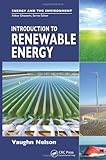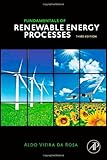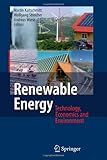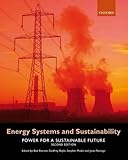Energy:
Introduction to Renewable Energy (Energy and the Environment)
 | As the world population grows and places more demand on limited fossil fuels, renewable energy becomes more relevant as part of the solution to the impending energy dilemma. Renewable energy is now included in national policies, with goals for it to be a significant percentage of generated energy within the coming decades. A comprehensive overview, Introduction to Renewable Energy explores how we can use the sun, wind, biomass, geothermal resources, and water to generate more sustainable energy. | |
| Read more |  | |
Your Questions About Sustainable Energy

Maria asks…
What aspect of renewable or sustainable energy would you be interested in looking into?
What aspect of renewable or sustainable energy would you, personally, be interested in looking into as a possible way to achieve a sustainable future?
Not asking anyone to answer this for me, but I don’t really understand the question. Is it asking like what type of energy source? Or what? Thank you!

admin answers:
There are several kinds of renewable or sustainable energy sources and these are different.
Renewable energy is what is there on our planet, that you can use and there will be more tomorrow, without you having to do anything. Those types of energy are solar and wind energy. You can capture these sources of energy fairly “easily”. (There are also geothermal, tidal and hydro electricity but those are not available everywhere – but they are all still renewable energy)
Sustainable energy comes from sources that you can keep going without reducing the availability (if you replace them). This would include wood, for instance. You can cut and burn wood for energy and replace it by planting more trees.
These are all different from non-renewable and non-sustainable sources, such as coal, oil and gas which are non renewable and non sustainable.
My personal interests would lie in (a) solar energy and (b) wood. In the northern part of the UK, the sun doesn’t always shine as much as we would like but wood grows well, so you get the use of both in case of need.

Helen asks…
What aspect of renewable or sustainable energy would you be interested in looking into as a possible?
What aspect of renewable or sustainable energy would you, personally, be interested in looking into as a possible way to achieve a sustainable future?
Not asking anyone to answer this for me, but I don’t really understand the question. Is it asking like what type of energy source? Or what? Thank you!

admin answers:
Solar power; Geothermal power; Windmills; Wave power and Tidal power are all necessary if we are to reduce our reliance on coal, gas and uranium to a sustainable level.
I personally am also interested in powering a laptop from a stationary bicycle with a fly wheel and generator.
Powered by Yahoo! Answers
Renewable Energy: Power for a Sustainable Future
 | The provision of sustainable energy supplies for an expanding and increasingly productive world is one of the major issues facing civilization today. Renewable Energy: Power for a Sustainable Future, Third Edition, examines both the practical and economic potential of the renewable energy sources to meet this challenge. The underlying physical and technological principles behind deriving power from direct solar (solar thermal and photovoltaics), indirect solar (biomass, hydro, wind, and wave) an | |
| Read more |  | |
What is Alternative Energy
There is a lot of energy that we can harness if we only seek to research and develop the technologies needed to do so. We can get away from the fossil fuels and the old electrical grids by turning to alternatives to these energy sources.
One of these alternative energy resources is wind power. Wind turbines continue to be developed that are progressively more energy efficient and less costly. Wind farms have been springing up in many nations, and they have even become more strategically placed over time so that they are not jeopardizing birds as former wind turbines did.
Another alternative energy resource is the one that is most well known: solar energy. This involves the manufacturing of solar cells which gather and focus the energy given off directly by the sun, and translate it into electricity or, in some cases, hot water. As with wind energy, solar energy creates absolutely zero pollution.
Ocean wave energy is seen by governments and investors as having enormous energy generating potential. A generator in France has been in operation for many years now and is considered to be a great success, and the Irish and Scots are running experimental facilities.
Hydroelectric power has been with us for a while and where it is set up, it is a powerful generator of electricity and cleaner than a grid. However, there are certain limitations to the availability of the right places to set up a large dam. Many run-of-the-river, or small and localized, hydroelectric generators have been set up in recent times due to this limitation.
Geothermal energy is extremely abundant, since it lies directly beneath our feet, just a few miles below the earth’s surface. This energy is produced by the heating of water through the actions of earth’s fantastically hot molten core. The water turns to steam, which can be harnessed and used to drive turbine engines which in turn generate electricity. Great amounts of research and development should be put into geothermal energy tapping.
Waste gas energies, which are essentially methane, reverse the usual energy-pollution relationship by creating energy from waste that lies in the dumps and from some air pollutants. This gas is used in fuel cells and can be used in standard gasoline generators.
Ethanol is a gasoline substitute and is created from such things as wheat, sugarcane, grapes, strawberries, corn, and even wood chips and wood cellulose. There is controversy over this fuel with regards to its ever becoming truly economical or practical except in very localized areas, but technologies for its extraction and admixturing are continuously being refined.
Biodiesel energy is created out of the oils contained in plants. So far, the commercial stores of biodiesel have been created using soybean, rapeseed, and sunflower oils. At the time of this writing, biodiesel is typically produced by entrepreneurial minded individuals or those who want to experiment with alternative energy, but commercial interest from companies is on the rise. It burns much cleaner than oil-based diesel.
Atomic energy is created in atomic energy plants using the process of nuclear fission. This energy is extremely efficient and can generate huge amounts of power. There is concern from some people about what to do with the relatively small amount of waste product atomic energy gives off, since it is radioactive and takes hundreds of years to decay into harmlessness.
Fundamentals of Renewable Energy Processes, Third Edition
 | With energy sustainability and security at the forefront of public discourse worldwide, there is a pressing need to foster an understanding of clean, safe alternative energy sources such as solar and wind power. Aldo da Rosa's highly respected and comprehensive resource fulfills this need; it has provided thousands of engineers, scientists, students and professionals alike with a thorough grounding in the scientific principles underlying the complex world of renewable energy technologies. This n | |
| Read more |  | |
Renewable Energy: Technology, Economics and Environment
 | This book presents the physical and technical principles of promising ways of utilising renewable energies. In this context, firstly the main characteristics of the available renewable energy streams are outlined. Subsequently, the book presents the technologies of heat provision from passive and active solar systems, ambient air, shallow geothermal energy as well as energy from deep geothermal sources. In the preceding chapters the book addresses the processes of electricity generation from sol | |
| Read more |  | |
Energy Systems and Sustainability: Power for a Sustainable Future
 | Interdisciplinary in its approach and global in its perspective, Energy Systems and Sustainability: Power for a Sustainable Future, Second Edition, provides a contemporary exploration of the economic, social, environmental, and policy issues raised by current systems of energy use. Emphasizing the important issue of sustainability, it analyzes the historical evolution of the world's energy systems, the principles underlying their use, and their present status and future prospects.Beginning with | |
| Read more |  | |
Fundamentals of Renewable Energy Processes, Second Edition
 | We are hearing a LOT about renewable energy these days! But unlike most available resources on alternative energy that focus on politics and economic impacts, da Rosa's practical guide, Fundamentals of Renewable Energy Processes, is dedicated to explaining the scientific and technological principles and processes that enable energy production from safe, renewable, clean sources. Advances in the renewable energy sphere are proceeding with an unprecedented speed, and in order for the world's alarm | |
| Read more |  | |
Renewable Energy, Fourth Edition: Physics, Engineering, Environmental Impacts, Economics & Planning
 | This volume is a true shelf reference, providing a thorough overview of the entire renewable energy sphere, while still functioning as a go-to information source for professionals and students when they need answers about a specific technical issue. Crafted over the last 15 years into a problem-solving tool for engineers, researchers, consultants and planners currently working in the field, as well as a detailed map of the renewables universe for those looking to expand into new technological sp | |
| Read more |  | |
Your Questions About Sustainable Energy For All

Paul asks…
Is scalar energy killing the universe?
0 point fluctuation or cosmic energy exists everywhere, we also know that it’s part of our consciousnesses.
A device that takes advantage of the casimir effect to generate electricity can provide free and sustainable energy for Mr mankind without the need for capitalism. The energy however is not created out of nothing . The energy comes from the quantization of certain forces to create movement. Would “Absorbing” energy from the universe like this technically reduces the lifetime of the universe. I know that energy can never be destroyed only conserved but this is something else all together.

admin answers:
The amount of energy in empty space is enormous but there is some doubt if it could be affected by any retrieval means we could come up with. It’s estimated that empty space contains Zero Point energy that is equivalent to many trillions of Joules of energy per cubic centimeter
” Since space itself is thought to break up into a kind of quantum foam at a tiny distance scale called the Planck scale (10-33 cm), it is argued that the zero point fluctuations must cease at a corresponding Planck frequency (10-43 Hz). If that is the case, the zero-point energy density would be 110 orders of magnitude greater than the radiant energy at the center of the Sun. ”
http://www.calphysics.org/zpe.html
“According to NASA, “the concept of accessing a significant amount of useful energy from the ZPE gained much credibility when a major article on this topic was recently [March 1st, 2004] published in Aviation Week & Space Technology, a leading aerospace industry magazine”.[11]
The calculation that underlies the Casimir experiment, a calculation based on the formula predicting infinite vacuum energy, shows the zero-point energy of a system consisting of a vacuum between two plates will decrease at a finite rate as the two plates are drawn together. The vacuum energies are predicted to be infinite, but the changes are predicted to be finite. Casimir combined the projected rate of change in zero-point energy with the principle of conservation of energy to predict a force on the plates. The predicted force, which is very small and was experimentally measured to be within 5% of its predicted value, is finite.[12] Even though the zero-point energy is theoretically infinite, there is as yet no practical evidence to suggest that infinite amounts of zero-point energy are available for use, that zero-point energy can be withdrawn for free, or that zero-point energy can be used in violation of conservation of energy.[13]”
http://en.wikipedia.org/wiki/Zero-point_energy
http://www.greenearth4energy.com/zero_point_energy.html
Over-unity hydrosonic pump….
Http://www.youtube.com/watch?v=478A91FoBW4&feature=related

Mary asks…
Should we add nuclear power to the Waxman climate bill now being marked up by congress?
Nuclear means clean, sustainable energy but it comes with its own set of problems. However, if we are ever going to switch our transportation from oil to more electric (plug in electric or hydrogen for example) won’t we need a lot of electricity? As an aside, to make hydrogen, the process most readily available is to split H20 molecules via techniques which require electricity.

admin answers:
Waxman is an imbecile. When asked what was in his bill, he was clueless. When you have the government running industry, it will get politicized and shortages and cost will increase. Waxman is a political hack of the worst kind. We should add nuclear but people like Waxman, trial lawyers, Jane Fonda, and environmental wackos have ensured that won’t happen.
Powered by Yahoo! Answers
